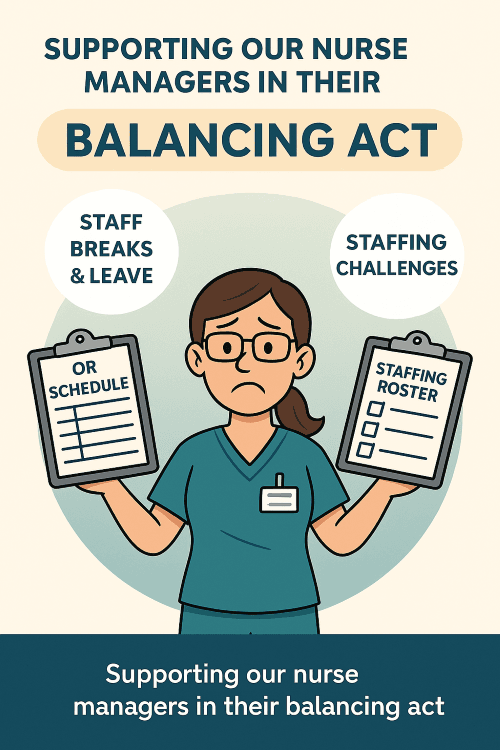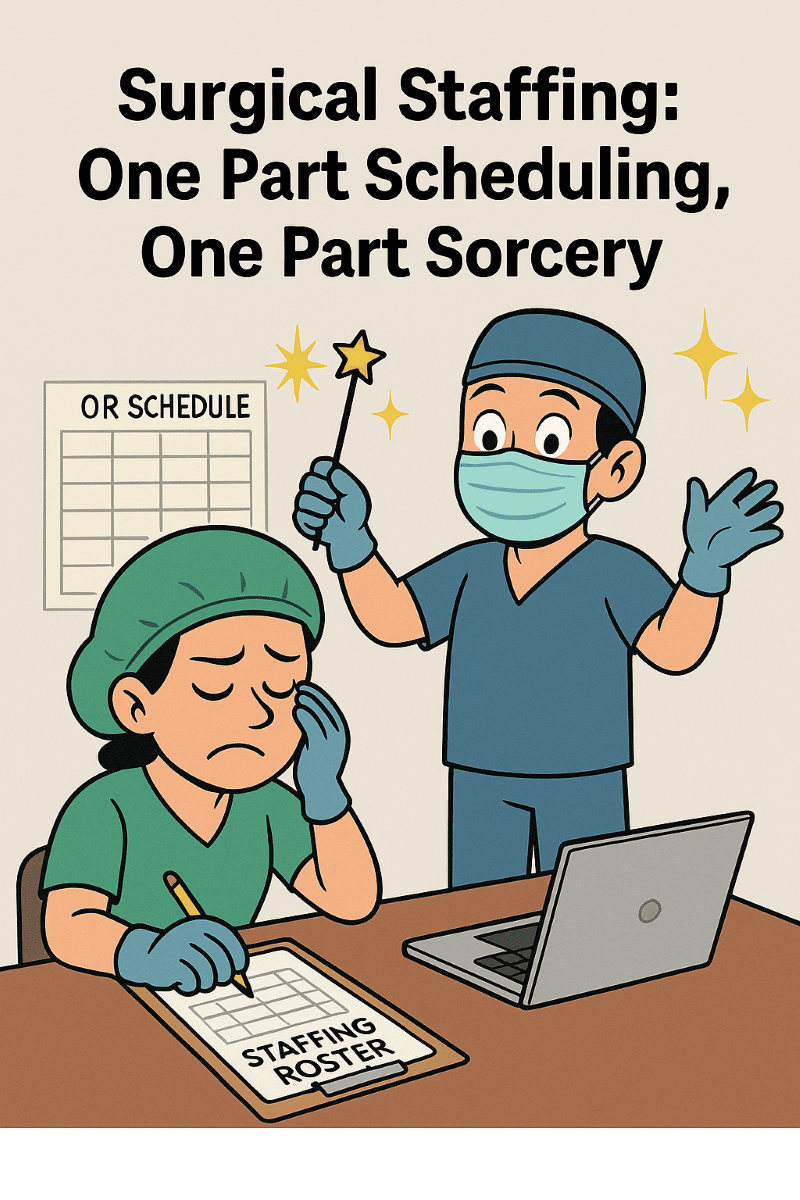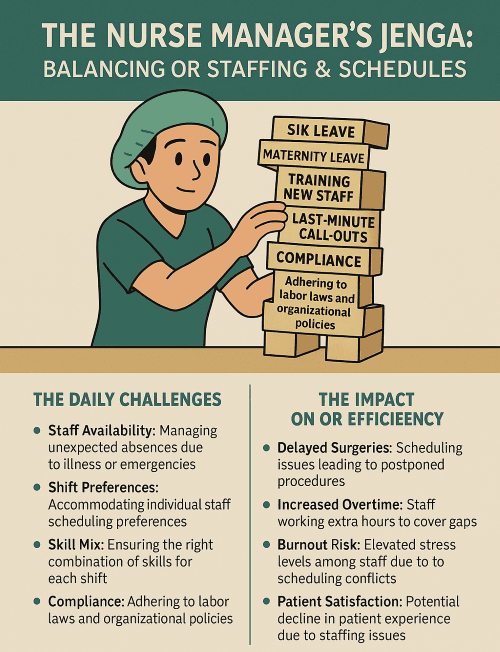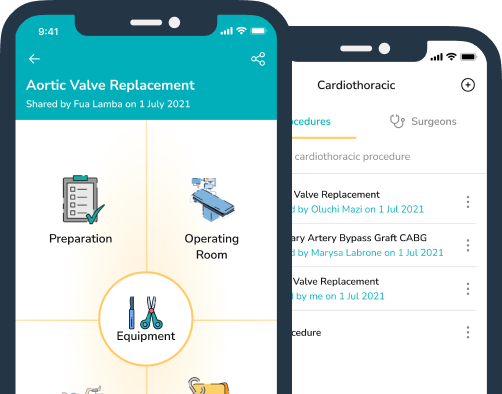🧱 When Rostering Feels Like Jenga: The Unseen Burden of Building OR Teams
Posted at 09 July 2025 in Nursing Workforce,Operating Room Leadership by Marrianne
💥 Introduction: Rostering Is No Small Feat
In a perfect world, every surgical team is consistent—familiar nurses, trusted techs, the surgeon’s “dream team.” But in the real world? Staffing the OR is a high-stakes game of Jenga.
Nurse managers must balance:
-
Leave, breaks, and unexpected absences
-
Maternity cover, new grads, and on-the-fly replacements
-
Skill levels, specialty experience, and surgeon preferences
One wrong piece—and the entire surgical list could collapse.
🧠 The Real Cost of Unseen Stress
While CEOs review performance metrics, the behind-the-scenes chaos of managing staff schedules is rarely noticed—until it impacts patients, delays cases, or increases staff burnout.
According to BMC Health Services Research (2019), communication breakdowns and inadequate team familiarity significantly contribute to flow disruptions in the OR, which can ultimately affect patient safety and surgical efficiency.

🔄 Enhancing Surgical Team Competency Through Cross-Specialty Rotations
In the dynamic environment of the operating room, consistent team composition is often challenged by factors such as staff breaks, holidays, maternity leave, sudden illnesses, and the necessity to train new personnel. These variables can disrupt the continuity that surgeons rely upon for optimal performance.
To mitigate these challenges, structured cross-specialty rotations have been identified as a valuable strategy. A comprehensive review published in the Journal of Surgery and Research underscores several benefits of such rotations:
-
Broadened Clinical Exposure: Trainees gain experience across various surgical disciplines, fostering a more versatile skill set.
-
Enhanced Teamwork: Exposure to different specialties promotes better understanding and collaboration among multidisciplinary teams.
-
Improved Patient Outcomes: A diverse training background equips surgical staff to handle a wider array of clinical scenarios effectively.
Moreover, the British Journal of Surgery emphasizes that cross-specialty training is instrumental in preparing surgeons for the complexities of modern patient care, which often requires a collaborative, multidisciplinary approach.
💡 Implementing Supportive Systems
To fully leverage the benefits of cross-specialty rotations, it’s crucial to establish systems that:
-
Facilitate Knowledge Sharing: Ensure that critical information is accessible to all team members, regardless of their primary specialty.
-
Support Continuous Learning: Provide ongoing educational resources to keep staff updated on best practices across specialties.
-
Promote Flexibility: Develop adaptable protocols that accommodate the dynamic nature of surgical team compositions.
By embracing these strategies, we can create a resilient surgical workforce capable of delivering high-quality care, even amidst staffing fluctuations.

🎯 Let’s Recognize the Real MVPs
To every perioperative manager playing roster Jenga…
To every team that flexes, fills gaps, and keeps surgery moving…
We see you. You’re not just building rosters—you’re holding the OR together.


🧱 The Nurse Manager’s Jenga: Balancing OR Staffing & Schedules
Section 1: The Daily Challenges
-
Staff Availability: Managing unexpected absences due to illness or emergencies.
-
Shift Preferences: Accommodating individual staff scheduling preferences.
-
Skill Mix: Ensuring the right combination of skills for each shift.
-
Compliance: Adhering to labor laws and organizational policies.
Section 2: The Impact on OR Efficiency
-
Delayed Surgeries: Scheduling issues leading to postponed procedures.
-
Increased Overtime: Staff working extra hours to cover gaps.
-
Burnout Risk: Elevated stress levels among staff due to scheduling conflicts.
-
Patient Satisfaction: Potential decline in patient experience due to staffing issues.
Section 3: Strategies for Stability
-
Advanced Scheduling Tools: Utilizing software to optimize shift planning.
-
Cross-Training Staff: Preparing staff to handle multiple roles as needed.
-
Open Communication: Maintaining transparent dialogue about scheduling needs.
-
Regular Reviews: Assessing and adjusting schedules proactively.Proactive Healthcare Staffing
“Supporting our nurse managers in their balancing act ensures a stable and efficient operating room environment.”
Recent Articles
Electrosurgery & Cautery Safety: Protecting Patients Through Vigilance, Communication, and Best Practice
09 December 2025
✈️From Pilots to Perioperative Practice: Why Organisation and Readiness Save Lives in the OR
28 October 2025


